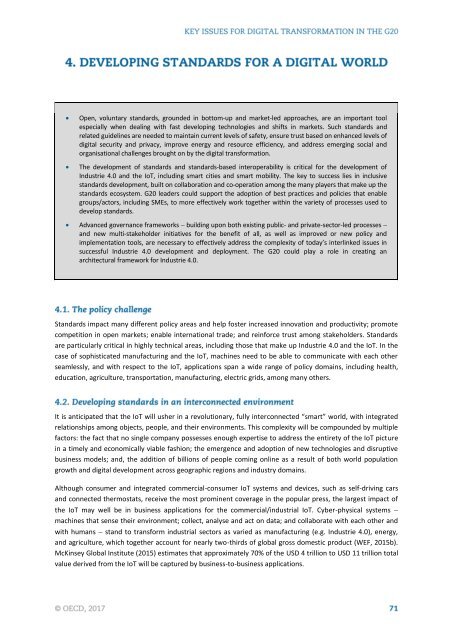KEY ISSUES FOR DIGITAL TRANSFORMATION IN THE G20
2jz0oUm
2jz0oUm
Create successful ePaper yourself
Turn your PDF publications into a flip-book with our unique Google optimized e-Paper software.
Open, voluntary standards, grounded in bottom-up and market-led approaches, are an important tool<br />
especially when dealing with fast developing technologies and shifts in markets. Such standards and<br />
related guidelines are needed to maintain current levels of safety, ensure trust based on enhanced levels of<br />
digital security and privacy, improve energy and resource efficiency, and address emerging social and<br />
organisational challenges brought on by the digital transformation.<br />
The development of standards and standards-based interoperability is critical for the development of<br />
Industrie 4.0 and the IoT, including smart cities and smart mobility. The key to success lies in inclusive<br />
standards development, built on collaboration and co-operation among the many players that make up the<br />
standards ecosystem. <strong>G20</strong> leaders could support the adoption of best practices and policies that enable<br />
groups/actors, including SMEs, to more effectively work together within the variety of processes used to<br />
develop standards.<br />
Advanced governance frameworks building upon both existing public- and private-sector-led processes <br />
and new multi-stakeholder initiatives for the benefit of all, as well as improved or new policy and<br />
implementation tools, are necessary to effectively address the complexity of today’s interlinked issues in<br />
successful Industrie 4.0 development and deployment. The <strong>G20</strong> could play a role in creating an<br />
architectural framework for Industrie 4.0.<br />
Standards impact many different policy areas and help foster increased innovation and productivity; promote<br />
competition in open markets; enable international trade; and reinforce trust among stakeholders. Standards<br />
are particularly critical in highly technical areas, including those that make up Industrie 4.0 and the IoT. In the<br />
case of sophisticated manufacturing and the IoT, machines need to be able to communicate with each other<br />
seamlessly, and with respect to the IoT, applications span a wide range of policy domains, including health,<br />
education, agriculture, transportation, manufacturing, electric grids, among many others.<br />
It is anticipated that the IoT will usher in a revolutionary, fully interconnected “smart” world, with integrated<br />
relationships among objects, people, and their environments. This complexity will be compounded by multiple<br />
factors: the fact that no single company possesses enough expertise to address the entirety of the IoT picture<br />
in a timely and economically viable fashion; the emergence and adoption of new technologies and disruptive<br />
business models; and, the addition of billions of people coming online as a result of both world population<br />
growth and digital development across geographic regions and industry domains.<br />
Although consumer and integrated commercial-consumer IoT systems and devices, such as self-driving cars<br />
and connected thermostats, receive the most prominent coverage in the popular press, the largest impact of<br />
the IoT may well be in business applications for the commercial/industrial IoT. Cyber-physical systems <br />
machines that sense their environment; collect, analyse and act on data; and collaborate with each other and<br />
with humans stand to transform industrial sectors as varied as manufacturing (e.g. Industrie 4.0), energy,<br />
and agriculture, which together account for nearly two-thirds of global gross domestic product (WEF, 2015b).<br />
McKinsey Global Institute (2015) estimates that approximately 70% of the USD 4 trillion to USD 11 trillion total<br />
value derived from the IoT will be captured by business-to-business applications.


